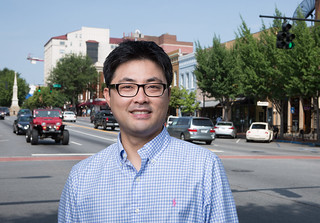
Wookjae Heo, a doctoral candidate in the Department of Financial Planning, Housing & Consumer Economics, researches financial stress and ways to increase a households’ financial well-being.
Heo conceptualizes financial stress as a relatively broad concept.
“Financial stress is an intangible situation that is triggered by financial issues (objectively or subjectively) and provokes a physiological reaction such as the change of body temperature, increase of skin conductance, and hormone changes,” he says.
Heo’s research involves these interactions between financial stress and the physiological reactions it causes.
“As a researcher in personal finance and consumer economics, I am interested in investigating the association between financial stress and behavioral changes at the level of households,” Heo explains.
He specifically studies economic hardship, financial constraints, and stressful financial situations that are assumed to stimulate financial stress in general life.
Heo describes two major ways that stress as a broad concept can be measured.
“Some researchers measure stress by asking people about their subjective stress levels (i.e., self-estimated stress level). Others measure stress by using bio-physiology evidence (i.e., hormone changes and skin conductance),” describes Heo.
Heo’s research, however, focuses on creating a stress measure that will borrow elements from both approaches.
“The working assumption is that financial stress is caused by financial stressors such as economic constraints and financial stimuli, and as such, it is possible to measure financial stress through surveys and physiological evaluations.”
By using both stress measurement approaches, Heo will be better able to determine how financial stress influences households when they engage in financial decision-making.
“Currently, we are investigating many possible indicators of financial stress,” he explains.
One measure that Heo plans to include is a self-reported survey on financial stress, (i.e. Are you satisfied with your current financial situation, Do you think you have the same level of financial resources as other people).
He also uses objective survey measures such as wealth level, income level, income change, and poverty ratio.
Heo will then combine the survey information with experiment-based indicators of physiological stress such as skin conductance and body temperature measures.
Additionally, Heo’s financial stress team, advised by Dr. John Grable, is working on expanding their physiological measure by including an assessment of how the brain behaves during stressful situations.
The preliminary results of their findings are encouraging.
Their research shows that short-term financial stress provokes a prompt willingness to engage in financial activities, such as visiting a financial planner. Long-term financial stress, however, decreases the willingness to engage in financial planning.
“This implies that long-term financial stress is associated with a sense of hopelessness because the critical points have been increased by the long term stress,” Heo reasons.
Ultimately, he hopes his research will help find ways to improve financial well-being among consumers.
“The core identity of my major is to increase household and consumer well being. Continuous research works about consumer economics including financial planning can open our eyes for a better life in the future.”
After graduation, Heo plans to remain in academia as a teacher and researcher. His goal is to continue his research and find ways to increase consumer well-being.
